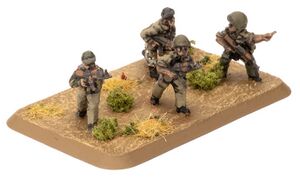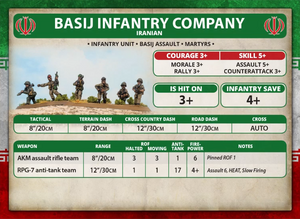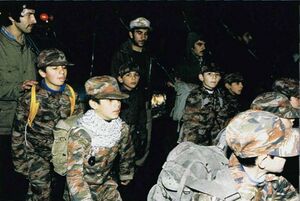Basij Infantry Company

"It is said that God is always on the side of the big battalions."
- – Voltaire
"It was simply a manner of out-smarting them. You see Kill-bots have a pre-set kill limit. Knowing their weakness, I sent wave after wave of my own men at them, until they reached their limit and shut down. "
- – Captain Zap Brannigan, Futurama
The Basij (meaning literally, the Mobilization or the Movement) were an all-volunteer paramilitary militia branch, before their merger into the Islamic Revolutionary Guard Corps. Following that, they were an official militia. The Basji didn't change much during the Iran-Iraq Wars, and though untrained and without any kind of vehicles to hide behind, sheer fanaticism is their sword and armor. It's a real pity that doesn't work too well against bullets.
In Team Yankee

Once upon a time, a battlefront developer decided that the Iranians needed a human-wave unit that laughed at the Czechs and the Basij were born.
The Basij are Team Yankee's first (but no longer only) footsloggers, that do not begin the game in transports, and are the only infantry with a 4+ save.
With a maximum strength of 25 AKM teams and 12 RPG-7 teams, the Basij is the Iranian equivalent of a super-sized motor-rifle company. While their armament may not be much to boast of compared to the Iranian mechanized platoon, they have a totally different role in the Iranian list: placing a massive blob in your enemy's face with spearhead deployments with fixed bayonets.
The Basij have two unique rules; Basij assault and martyrs. Martyrs gives you a 6" charge distance while Basij assault allows your troops to spearhead during the deployment phase but only if placed in the regular deployment zone, and have the usual limitations on spearheading. They also lose bulletproof cover, as a result of charging in the open with hymns to the almighty.
Unlike the mechanized platoon which has enough anti-armor weapons to put holes in vehicles and 16” MG3s to fight infantry with, the Basij should be expected to fight enemy infantry under the cover of smoke and have enough bodies to beat nearly all infantry in close combat. Unfortunately, your army of fanatical martyrs has a 4+ Infantry Save to offset their rather excellent 3+ Morale, Courage, Rally, Assault and Counterattack. They cost less than their Soviet spam counterparts too: 7 points gets you 9 AK teams and 4 RPG teams while 22 points gets you 25 AK and 12 RPG teams.
Here's the kicker: at such a low cost, these units can tarpit almost as well as the Czechs, with the advantage of having excellent morale. Hit by artillery? You'll get back into the fight on a 3+. Took 8 hits of MG fire? 3+ to get back in the fight. Without transports or heavy machine guns and support weapons, they'll be a poor match against enemy infantry in a fair fight. Fortunately, you're bringing enough troops to tilt the odds in your favour and scare the crap out of an opponent who doesn't know how to deal with Napoleanic blocks of the righteous literally marching over their enemies. They might not be the most well-trained troops, but their armaments and numbers can seriously hurt any unit that gets too close.
Aside from the Basij infantry battalion, the T-62 tank company is the only other list that can bring Basij to the field.
While Basij can use their Basij Assault as a form of Spearhead move, it is almost never worth it. It has the same limits as normal spearhead (cannot go within 16" of enemy, enemy deployment zone or any objective etc) and the Basij lose bulletproof cover for the entire game. So only under very specific circumstances can you assault turn 1 with Basij.
IRL

The Basij started out as your standard paramilitary youth toughs for the new revolutionary government, but they were quickly mobilized by the Iranian government into an ad-hoc milita force shortly after the Iran-Iraq war started. The Basij's ranks were open and encouraged membership from the age of twelve to eighty, with very little training (if any) given. Similar to the Volkssturm of Nazi Germany during the last days of the Third Reich and the revolutionary mobs of the first French Republic the performance of the Basij was mixed at best. At times, their fanatical nature gave them the edge in night raids into the Iraqi lines, the dark making up for a lack of armor or transport besides their own feet in closing with the enemy. At other points, Basij units were used as human mine clearers and machine gun bait, paving the way for the better trained army units or softening up resistance with human wave attacks. The casualties they suffered during offensive operations was wildly disproportionate with that of any other unit, especially at the start of the war.
In terms of attack tactics, the Basij would develop a relatively effective method of breaking through Iraqi static defenses, although at a heavy cost. 20+ man squads would engage in probing attacks on the line, looking for gaps in defensive works. When a weakpoint was discovered, the reserve sections would be sent in to force the issue, World War 1 style. "Human Wave" attacks are often what this is characterized as, but it was more similar to the infiltration assault tactics used by the Allies for Trench raids and the Chinese in Korea. These squads would attempt to suppress, surround, and close with the enemy, overrunning the static defenses and seizing the position. By their very nature, these assaults were often bloody and resulted in high casualties when the defenders weren't overrun quickly.
Towards the end of the war, the Basij had essentially become more of a proper militia and military unit. Organization, training, and equipment, while not amazing, were all vastly improved by 1985 to the point that they could be considered a dedicated light infantry force. And like any light infantry force, they would get absolutely slaughtered whenever heavier elements of the Iraqi forces decided to show up.
The Basij are somewhat unfairly maligned as a force of nothing more than Shia fanatics and child soldiers. While of course this is in part an accurate description of the Basijs makeup (see the above pics), it isn't entirely true and taints the overall picture of the nature of this war from the Iranian perspective. Many Basij members came from other ethnic and religious groups across Iran (including Jews, Kurds, Arabs, and Zoroastrians), and many were not motivated so much by a Shia 'love of Martyrdom' but rather a sense of genuine patriotism (and/or a disdain for the Iraqi army and its brutal tendencies). Many were the products of middle class families, and even women joined the Basij (in auxiliary roles, of course). For the Iranian people, this war was and still is a point of national unity, and everyone who died in the Basij, regardless of faith or ethnicity, is a martyr to the revolution.
One must remember that during the Iran-Iraq was, a vast majority of the worlds powers supported Iraq, and as such the Iranian government was often depicted as near comically evil. There are many stories about the Basij going into battle with 'golden keys to paradise' (though these are almost certainly false.) This is not to deny that many children were practically press ganged or encouraged to join the Basij, and many suffered terribly in the fighting with the Iraqi army.
It is important to remember this was for the Iranian people and government, a war of national survival and identity. Extreme measures were taken by both sides. For the Iraqis, it was chemical weapons use. For the Iranians, it was a willingness to send the young and the old alike into the meat grinder. The Iran-Iraq War was unbelievably brutal, and the suffering of millions is testimony to man’s inhumanity to one another.
| Iranian Forces in Team Yankee | |
|---|---|
| Tanks: | T-55 - T-62 - M60 Patton - Chieftain |
| Transports: | M113 Armored Personnel Carrier - BTR-60 - BMP-1 |
| Troops: | Iranian Mechanized Platoon - Basij Infantry Company |
| Artillery: | M109 Howitzer - BM-21 Hail - M125 81mm |
| Anti-Aircraft: | ZSU 23-4 Shilka - ZSU-57-2 - SA-8 Gecko |
| Tank Hunters: | Jeep TOW - Jeep 106mm Recoilless - M113 106mm Recoilless |
| Recon: | Scorpion |
| Aircraft: | AH-1 Cobra Attack Helicopter |
| Soviet Support: | SU-25 Frogfoot |